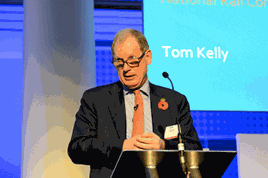The planning and delivery of High Speed 2 moves on in leaps and bounds almost every day. Progress is extensive, but Tom Kelly, the project’s strategic communications director, is anxious for the rail industry not to get ahead of itself.
“Parliament is still considering our Hybrid Bill. While much progress has been made, we cannot take it for granted,” Kelly told delegates at RAIL’s National Rail Conference in Leeds, on November 5.
His optimism could not be concealed entirely though: “Even though we can’t say with absolute certainty that it’s not a case of ‘if’ but of ‘how’, we’re near the point where we’ll be able to do so.”
Kelly explained further: “You bank progress as you go along. You solve problems one by one. You maintain momentum towards that final goal at all costs. Sometimes that process can be reasonably straightforward – steady and linear. Sometimes it resembles more of a stumble. But the key is to it keep moving forward, however slowly. During the last 12 months HS2 has made progress and we’ve built on it as we’ve gone along. So far, so good.
“But one thing I’ve learnt over many years - and many stumbles - is that when you’re trying to carry out a major project, the biggest danger is yourself. You can get ahead of yourself both individually and collectively. The sheer size and complexity of HS2 remains absolutely awe-inspiring. And that’s why, to ensure success, we’ve remained dependent on local stakeholders.”
It is widely accepted that one of the keys to maintaining that focus is collaborating with others to achieve the common goal. The involvement of stakeholders at every stage is vital to every project, regardless of its size.
Kelly made this point: “Just as HS2 isn’t a standalone project in transport terms, so HS2 Ltd cannot deliver HS2 on its own. It needs to work with many others.”
He surprised the audience by praising the work of individuals normally forgotten, or viewed with an element of disdain: “We will be forever in the debt of the hardworking MPs who serve in the Select Committee hearing petitions. It’s a mammoth task. But they’re steadily and quietly getting on with the job, working their way through the Phase 1 route. Their professionalism, their commitment, along with that for our staff who have handled the process, has been, in my mind, hugely impressive.
“So too has been one other development - the maintenance of the bipartisan approach across Government and the opposition, and of local government, North and South, East and West. And the advantages of continuity that come from having a Secretary of State who transitions from one administration to another are enormous. As too are the advantages of having a Shadow Secretary who has followed the brief for some time. We haven’t had to go through the whole re-education process.”
But Kelly was also keen to point out that the commitment of MPs to the project has had far more wide-reaching benefits: “This continuity at Parliamentary level has also reflected another positive development in the past 12 months. HS2 is increasingly seen as important for infrastructure in general, and regarded by local government as beneficial.
“As a nation we’re beginning to think more analytically about our infrastructure needs. But we’re also thinking on a local level, making sure we maximise the benefits for local economies. And the establishment of the National Infrastructure Commission, chaired by Lord Adonis, opens the door to a more consistent infrastructure in this country. Whether that’s in transport, energy (in which I have an interest), or with climate change or broadband.”
Kelly went on to explain the benefits of that local government involvement:
“Equally, the establishment of Transport for the North brings closer the Northern Powerhouse vision. A launch I attended a few weeks ago in Derby, with Midlands Connect, will bring forward the day when the East and West Midlands begin to act as one region, rather than the historically loose alliance it has been. The same goes for HS2 and the cities down the East side of the country, from Newcastle southwards. And the encouraging coalescence we’ve seen in the North West involving Crewe and Stoke is unprecedented.”















Login to comment
Comments
No comments have been made yet.